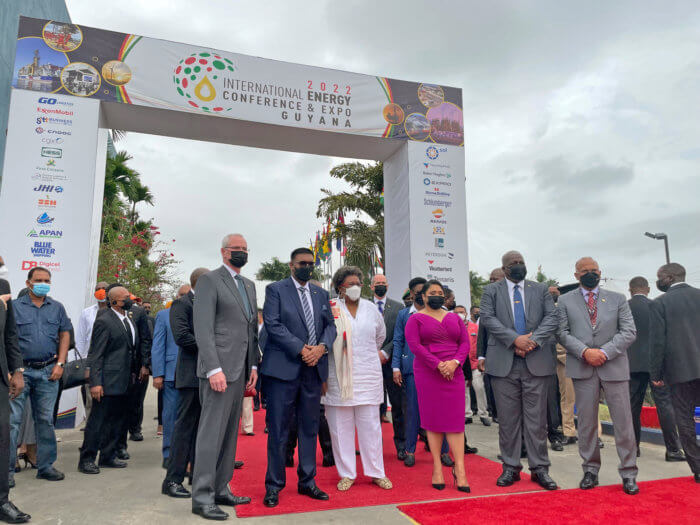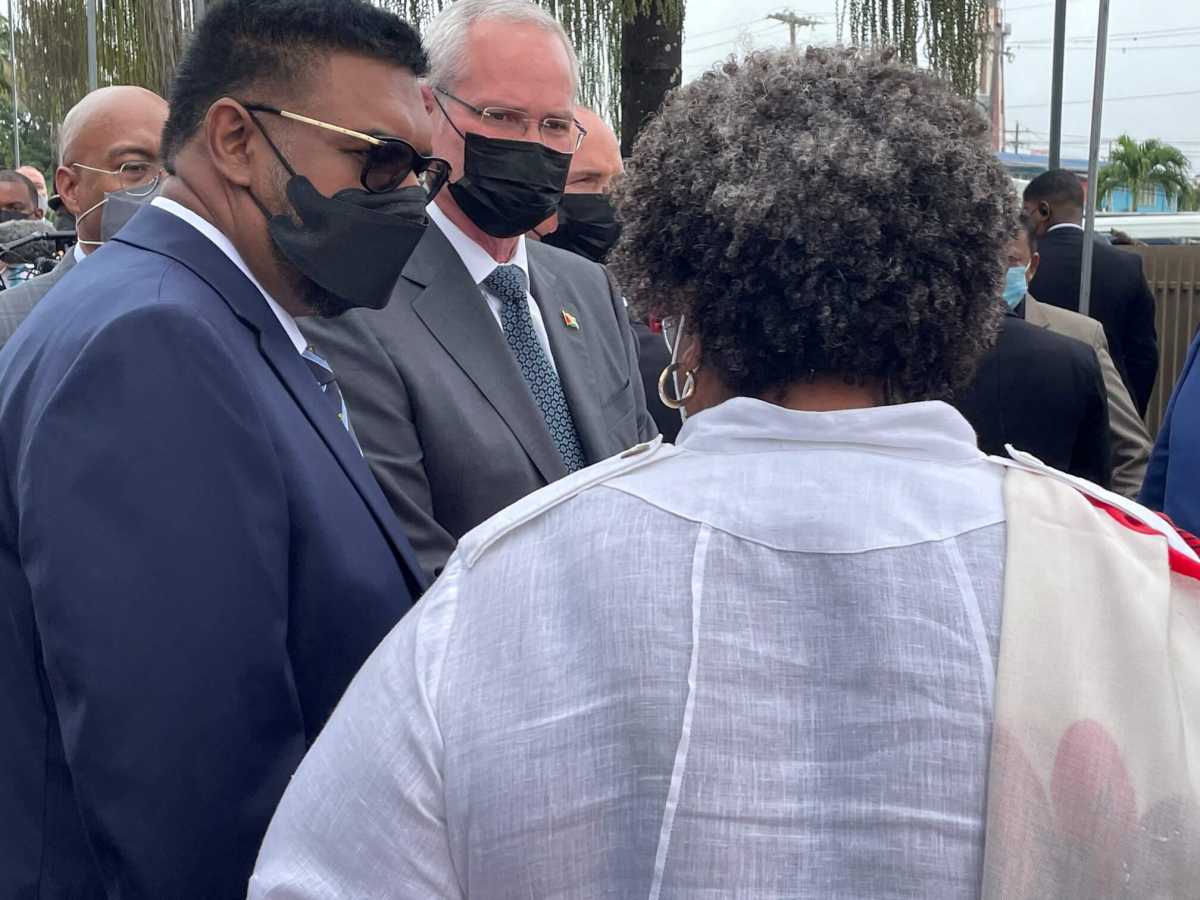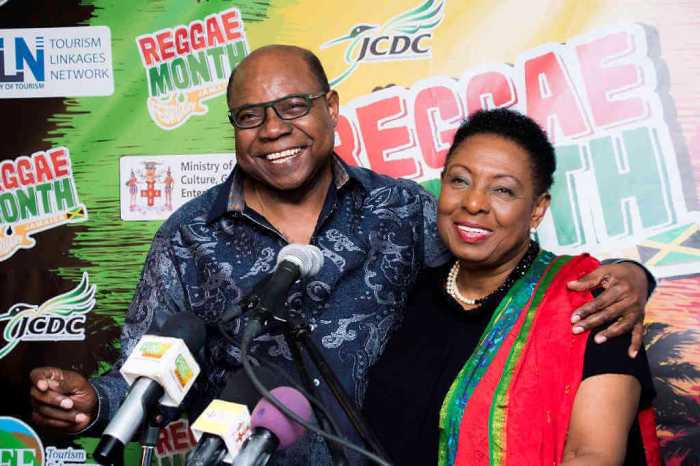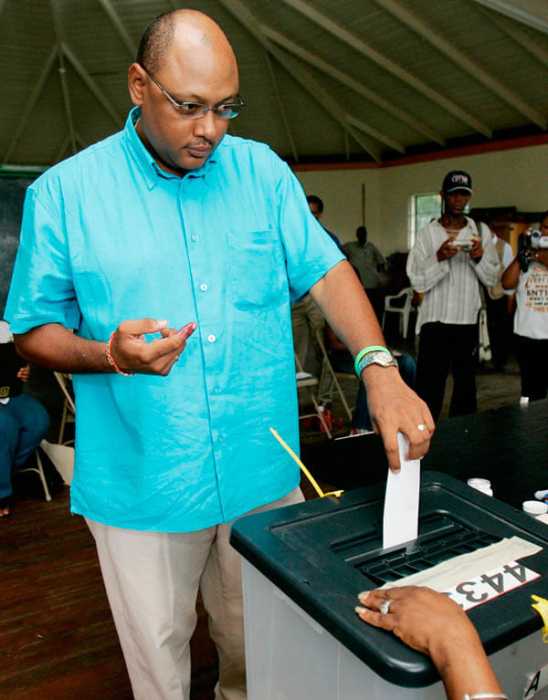Two regional leaders and one from Africa attended Guyana’s now much vaunted annual energy conference this week but even as they urged the country to ensure it gets its fair share from its oil and gas resources, the head of ExxonMobil merely noted all their warnings while boasting that the Guyana basin was perhaps the best in the world and will produce billions of barrels of oil for the company in the coming years.
Darren Woods, Exxon’s chief executive boasted and bragged about the local basin in the presence of Barbadian Prime Minister, Mia Mottley, President Chan Santokhi of neighboring Suriname and Ghanaian President Nana Akufo-Addo pointing out that the number of successful wells it has found offshore Guyana since 2015 has not been matched by its work anywhere else in the world. He put the global oil and gas sector on notice that the 30 gushing wells found in the past six years are only just the beginning of unprecedented drilling success the company has achieved in the largest and most-resource rich CARICOM member nation.
As police kept protesters at bay who were pressing for better production sharing arrangements, increased royalty payments and insurance coverage for offshore assets, Woods said national daily oil production has shot up from nothing per day six years ago to 340,000 barrels currently. The basin so far has more than 10 billion barrels of oil. This is expected to rise exponentially when two more oilfields — Payara and Yellowtail are brought into production in the next three years alongside producers, Liza-1 and 2.
“Our collective success here is unmatched in modern history. Since 2015. This progress is virtually unprecedented. In just 15 years, Guyana’s production has gone from nothing to potentially more than 1 million barrels per day. Since 2015, more than 11 percent cent of the conventional oil discovered in the world has been found right here in Guyana. He also talked up the future as protestors demanded a renegotiation of the contract, signed more than 20 years ago when the basin was unproven and controversially amended by the last government.
“We expect to have six projects produced by 2027 and see the potential for another four in later years,” Woods also said. This could mean that the highly prolific Stabroek Block will be producing more than a million barrels daily, making Guyana one of the largest producers.
In the region, Guyana is by far the biggest producer, surpassing Suriname’s 16,000 barrels daily from onshore wells and 1,600 in Barbados, also from onshore wells. Companies like Exxon, Total and Apache Oil are rushing to convert the Suriname find to full production in the next three years or so.

As Exxon continues to ramp up and press local authorities to approve new production fields, there is growing pressure on the Irfaan Ali administration to find ways of renegotiating arrangements with Exxon, particularly as it pertains to production sharing deals, royalty payments, Exxon’s tax payment obligations, oil spill mitigation and avoidance plans and the cost of production. The deal is regarded as one of the most lopsided in the world.
Activist and Guyana Kaieteur News publisher, Glenn Lall Wednesday argued that all national efforts must be made to renegotiate the deal with Exxon so the country can get a better deal from the level of success Exxon and consortium partners Hess Oil and China’s CNOOC have achieved in Guyana. Current clauses mean that the consortium recovers up to 75 percent of production as cost oil, leaving 25 percent to be split evenly with Guyana. Additionally, Guyana gets a mere two percent in royalty payments.
“We are wasting time and putting future generations at risk if we don’t get at least 20 percent royalties and put in place full insurance coverage for oil spills and other activities as a spill can affect all of our neighboring countries,” said Lall as he joined protestors near the Marriott conference venue.
International attorney Malinda Janki is also among those heaping pressure on authorities for better financial arrangements for Guyana.
“Under this deal, when you take everything into account, Guyana gets roughly 10 percent and Exxon and its two partners get 90 percent, if that isn’t exploitative, then I don’t know what is and I think it’s really important that people should understand that the oil sector is exploiting them,” she said recently.
Speaking before Darren Woods, PM Mottley argued that locals must benefit from national patrimony, views which were shared by President Santokhi and Akufo-Addo.“We will have difficult conversations, as well as in CARICOM and we must, but those conversations recognize that in every country, there are even regional and local conflicts and disagreements and it is our duty to be able to smooth that over, but to ensure that at no stage as newly independent countries of the world do we leave our citizens as tenants in their own land, but make them owners,” Mottley said.


























